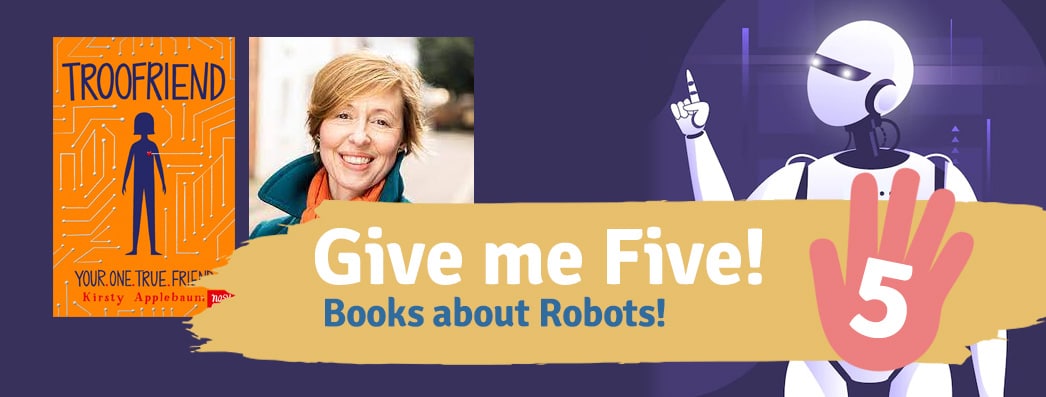Five Books Featuring Robots – Kirsty Applebaum
With her new story about artificial intelligence launching this month, TrooFriend author Kirsty Applebaum has picked out her own top 5 books about robots.

With her new story about artificial intelligence launching this month, TrooFriend author Kirsty Applebaum has picked out her own top 5 books about robots.
If I could only choose one book for this list, it would be I, Robot. It’s a collection of connected short stories written mid-twentieth century, featuring the robots manufactured by Asimov’s fictional organisation, U.S. Robotics and Mechanical Men, Inc. I, Robot explores the ethics and practicalities of artificially intelligent machines, and each story is brilliantly plotted within the strict framework of Asimov’s three laws of robotics. My desert island robot book.
If you’re looking for a heartwarming and thought-provoking storytime read, The Wild Robot by Peter Brown is the perfect choice. This highly original story combines themes of technology and nature and is a sure-fire hit in the classroom.
The story follows a curious robot called Roz, who finds herself stranded in the wild on an island. Roz must learn to survive and earn the trust of the island’s animals.
This is a beautiful tale of acceptance, friendship and what it means to care about others. With short chapters and lovely illustrations, The Wild Robot is a delightful read for Year 3 and beyond.
This imaginative debut novel is set in a world in which children are either ‘propers’ – that is, real children – or robotic ‘mechanicals’ and it follows the story of a boy called Christopher who assists the curious mechanical engineer Mr Absalom. When an unfortunate accident occurs under Mr Absalom’s care, Christopher is forced to embark upon an adventure that will lead him to discover his true identity, with the help of a group of trustworthy friends both mechanical and proper. The plot is full of twists and turns and we love how the unusual fantasy world that Pádraig Kenny has created is realised in an exceptional way that is at once convincing and beguiling. The story raises some really thought-provoking questions about artificial intelligence and its ethics, although the very relatable themes of humanity and belonging lie at the heart of it. We can’t recommend this enjoyable and interesting story highly enough for upper KS2.
This is the book I wish I’d written. There is just something about it that grabbed me from the first page. It is the story of Christopher, a real boy, and his friends who are all mechanicals and it explores the nature of friendship and being human. It is a very exciting story with richly drawn characters, set in an alternative 1930s. There are echoes of the Wizard of Oz and I think, if there is justice in the world, that it should be a classic and must read for ages nine and up.
I had to include Frankenstein here. Mary Shelley’s nineteenth century novel has been cited as the first ever work of science fiction – and Victor Frankenstein’s shocking creation, while not a robot, is certainly an artificial intelligence of sorts. Frankenstein explores what it means to be human and examines the ethics and unforeseen consequences of creating a self-aware being. Would the rest of this list even exist without it?
One of my stand-out books from recent years was Kirsty Applebaum’s unique and thrilling TrooFriend. Equally original and just as electrifying, TrooFriend merges a thoroughly modern narrative about the ethics of artificial intelligence with relatable domestic themes of friendship, family and identity.
With busy working parents, Sarah longs for a pet for company. Her parents agree that some company would be good for Sarah and it soon arrives, but not quite in the form that Sarah was hoping for. Instead, Sarah receives a Jenson & Jenson TrooFriend 560 Mark IV – a robot marketed as an artificially intelligent ‘better choice’ of playmate who is like a human child but does not bully, harm, lie or envy.
It takes Sarah a while to warm up to her new friend, whom she names Ivy. At first, Sarah interacts with Ivy only to please Mum, but is quick to flick the off-switch as soon as possible. But slowly, Sarah and Ivy start to become true friends, bonding over hairstyles, clothing and art. Ivy tries to help Sarah with friendship problems at school, and soon Sarah finds herself wondering whether her human-like friend might have feelings of her own. When a fault in Ivy’s model is announced and all TrooFriend 560 Mark IVs are recalled to the factory for destruction, Sarah finds herself embroiled in a battle of android rights that centres around the very essence of what it means to be human.
The offer of a robotic companion to entertain the children of busy, working parents would be an easy sell. But when it comes to real relationships and emotions, things are rarely straightforward, and the potential issues of replacing humans with androids emerge early in the plot. The narrative is told from the first-person perspective of TrooFriend robot Ivy, which gives the story a unique edge and immediately plunges the reader into considering the book’s key questions about what gives androids (or anyone) rights, identity and worth. Ivy’s voice develops gradually through the book, from a series of repeated, pre-programmed platitudes to an independent flow of consciousness affected by human connections. The evolution of Ivy’s voice occurs in increments so small – and skillfully written – that you hardly notice it happening, as she moves away from her programming and develops a real personality of her own.
Ivy’s self-liberation emerges in parallel with Sarah beginning to treat her as an equal rather than an object; this makes a really interesting thread of the plot that could develop into much thought and discussion around wider issues of oppression, AI and human rights.
There’s plenty of humour to be found too in Ivy’s sharp observations about human behaviour and despite the ambitious nature of its themes the story never feels too heavy. It’s a relatively quick read for Year 6 with a gripping storyline. Still, the questions it raises about human nature, the ethics of artificial intelligence and the complications of android rights will stay in your musings for quite some time after finishing.


© BooksForTopics 2015-2024
review
Year group(s) the book is most suitable for:
Year group(s) the book is most suitable for:
Does the book contain anything that teachers would wish to know about before recommending in class (strong language, sensitive topics etc.)?
Does the book contain anything that teachers would wish to know about before recommending in class (strong language, sensitive topics etc.)?
Would you recommend the book for use in primary schools?
yes
Curriculum links (if relevant)
Curriculum links (if relevant)
Any other comments
Any other comments